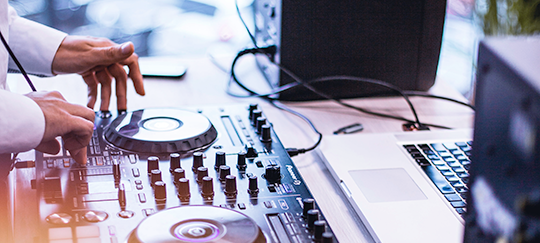In today’s music world, the role of a DJ is far more than just playing music. With their artistry and technical skills, DJs have become essential figures in shaping the soundscape of modern music culture. From nightclubs to major festivals, DJs control the atmosphere, influence trends, and even become iconic figures in the music industry. So, what does a DJ do in the music industry, and how do they contribute to the ever-evolving world of sound?
The Evolution of the DJ Role
The DJ’s role has evolved significantly over the decades. What started as a simple act of playing records has transformed into a multifaceted career that involves producing music, curating live events, and even influencing pop culture. In the early days, DJs were the ones responsible for selecting music for radio broadcasts, clubs, or parties. They were tasked with playing the hottest tracks, mixing them seamlessly, and keeping the energy high.
However, as music technology advanced, so did the responsibilities of a DJ. The introduction of digital tools, such as the turntable, CDJs, and DJ software, gave artists more control over how they mixed and presented music. Today, DJs are seen as performers, composers, and even music producers. Their work transcends the traditional concept of simply playing tunes for a crowd to enjoy.
What Does a DJ Do: The Core Responsibilities
A DJ’s job encompasses a variety of tasks, each contributing to the success of a performance or a career. At the core of it all, the DJ is a curator, selecting the right tracks at the right time to create an unforgettable atmosphere. Here’s a breakdown of some key aspects of what a DJ does.
Curating and Selecting Music
The first and most important task of a DJ is curating the music. A DJ must have an extensive knowledge of music across various genres, tempos, and styles. Their ability to select tracks that resonate with the audience is crucial. In many cases, the DJ’s role is not just about playing popular hits but about discovering new music and introducing it to their listeners.
For many DJs, music curation is an ongoing process. Whether it’s creating playlists for a club set, finding tracks that work together, or blending genres in a unique way, the selection of music defines the DJ’s style and sound. Knowing what the audience responds to while also staying true to personal musical tastes is an art in itself.
Mixing and Blending Tracks
One of the most significant skills a DJ must possess is the ability to mix tracks seamlessly. This process involves adjusting the tempo, key, and rhythm of different songs so that they flow smoothly into one another. This is done using various equipment, including turntables, CDJs, mixers, and DJ software. DJs manipulate the beats and sounds to create continuous music that keeps the crowd engaged.
Mixing goes beyond just playing songs in sequence. It’s about creating a cohesive journey for the audience. The transition from one track to another should feel natural, building up or winding down the energy of the crowd. This is where a DJ’s creativity truly shines. They decide when to fade in the next track, when to add effects, and how to layer sounds to keep the music exciting and dynamic.
Performing Live at Events
DJs often perform live at a variety of events, from small clubs to massive festivals. These performances are where DJs truly showcase their skills. The energy in the room is directly influenced by the DJ’s choices, which makes live sets one of the most intense parts of their work.
During a performance, a DJ doesn’t just play music; they read the room. Understanding the crowd’s mood, energy, and preferences allows the DJ to adapt their set to create the right vibe. This ability to connect with an audience and manage the energy of a live performance is a crucial part of what does a DJ do at an event.
The connection between the DJ and the crowd can turn a regular night into an unforgettable experience. Skilled DJs know when to drop the perfect track at just the right moment, and their interactions with the audience become part of the performance itself.
Producing Original Music
While many DJs focus solely on live performances, others expand their careers by producing their own music. This involves creating original tracks, remixes, or even entire albums that they can play in their sets. Music production has become an integral part of what a DJ does, allowing them to influence the sound of the industry and push musical boundaries.
Producing music involves various elements, from writing melodies and lyrics to mixing and mastering tracks. It’s a time-consuming process that requires a deep understanding of music theory, technology, and creativity. DJs who produce their own music often have more control over their sound, allowing them to define their style and gain recognition for their unique productions.
Building a Personal Brand
In the modern music industry, a DJ’s personal brand plays a huge role in their success. It’s not enough to just be good at mixing tracks; DJs must also build a strong online presence and connect with their audience on social media platforms. Having a personal brand that resonates with fans can help DJs land more gigs, gain sponsorships, and grow their fanbase.
Social media platforms, such as Instagram, Twitter, and YouTube, are powerful tools for DJs to share their music, behind-the-scenes moments, and personal lives. A strong online presence can be the difference between a DJ’s career staying local or becoming global. Fans want to feel connected to the artists they love, and social media allows DJs to engage with their audience in real time.
Networking and Collaborating with Other Artists
Networking is a vital part of being a DJ. Whether it’s connecting with club owners, event organizers, or fellow DJs, building relationships in the industry can open doors to new opportunities. Many DJs collaborate with other artists to create new music, remix songs, or perform at joint events. These collaborations help DJs expand their reach and introduce their sound to new audiences.
Being involved in a community of musicians and industry professionals also helps DJs stay updated on trends and developments in the music world. Collaborations, partnerships, and networking are integral to long-term success in the competitive music industry.
The Technological Side of DJing
The rise of digital technology has revolutionized the way DJs perform. Traditional vinyl records have been replaced by digital controllers, laptops, and software programs that allow for more precise control over music. The shift to digital has made DJing more accessible, with aspiring DJs being able to start their careers using software like Serato, Traktor, or Ableton Live on a laptop.
In addition to mixing music, DJs now use digital tools to create live edits, mashups, and remixes in real time. They can use effects, loops, and samples to enhance their performance, adding a layer of complexity and excitement to their sets.
The technology used by modern DJs also allows for more flexibility and creativity. DJs are no longer confined to just mixing tracks; they can create unique soundscapes, experiment with new genres, and even incorporate visuals into their performances.
DJs as Influencers in Popular Culture
Beyond the music itself, DJs have become cultural influencers. With the rise of electronic dance music (EDM) and the global popularity of DJ-led festivals like Tomorrowland and Ultra, DJs have reached celebrity status in many parts of the world. They’re not just musicians; they’re trendsetters, fashion icons, and leaders of the global dance music movement.
Some DJs have even transcended the world of music to become mainstream figures. Artists like David Guetta, Calvin Harris, and Tiësto have become household names, not just for their music but for their influence in the fashion, entertainment, and lifestyle sectors.
Conclusion
So, what does a DJ do in the music industry? The answer is multifaceted. DJs are curators of music, performers, producers, and cultural influencers. Their role extends beyond just mixing songs and creating playlists. They shape the energy of live events, influence music trends, and push creative boundaries. With the rise of digital technology and the growing global appreciation for electronic music, DJs continue to be at the forefront of the music industry, offering new sounds, experiences, and connections to their audiences. Whether they are mixing at a local club or headlining a massive festival, DJs are integral to the modern music scene, making their mark on culture and history.










